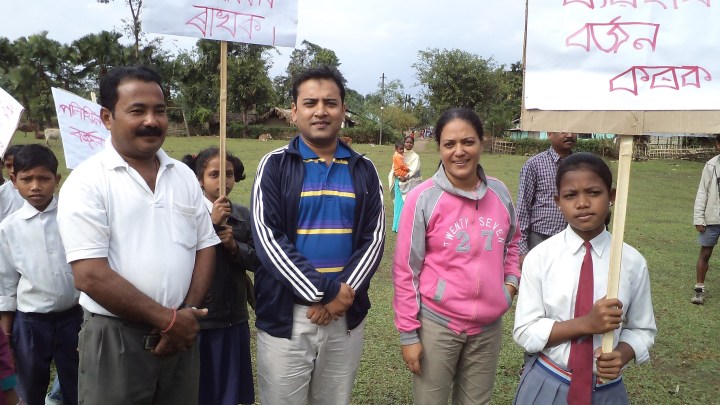By Mousumi Bharali
Apeejay Tea deployed its first Welfare Officer in 1987, just a few years after Apeejay Surrendra Group diversified into its tea business. Their original responsibility was to carry out population census, attend to labour complaints on housing and ensure safe potable water by constructing and inspecting concrete tube well plinth. They were also responsible for Sanitation and School and Hospital maintenance.
During the initial years, helping workers in solving their personal issues like elopement, fighting with neighbors, abandoning of parents, etc. have come up as their main challenges. However all of that has changed now. In the beginning of the 1990s, Assam witnessed her worst phase of insurgency. As Tea Gardens were mostly situated in remote areas, the tea industry was affected very badly and there was large scale exodus of executives creating a mass vacancy across the Industry.
At this time, since most of the newly-recruited welfare officers were from the local native areas, they came to shoulder various additional responsibilities of garden Assistant Manager and Factory Assistant Manager. In many tea gardens, Estate Manager and Welfare Officer had to solely discharge all responsibilities of the garden. This was the turning point of the entirely changed role and concept of welfare officer and their job was defined by the Manager of the respective estates.
 Apeejay Tea took two quick decisions thereafter that changed the role of Welfare Officers
Apeejay Tea took two quick decisions thereafter that changed the role of Welfare Officers
- Apeejay Tea, decided to upgrade the welfare officers to the post of Assistant Manager. The upgradation was based on their efficiency and their efficiency was evaluated through written tests and interviews. Recommendation of their work played a vital role. I will not be exaggerating if I say that this decision of our company has enabled Apeejay Tea to avail many efficient managers and Manager in Charge, in place in our Management Structure today.
- In the late 1990s, Apeejay Tea went one step further and adopted the historic policy of appointing lady Welfare Officers. As a result of this policy I joined in the April of year 2000 ! As quoted by a renowned former planter, this decision was one of the wisest decisions the company had ever taken and the implementation of on ground learnings by this Planter.
Sustainability is indispensable to our company and is woven into Policy. Within a few years of my joining I was asked to shoulder the additional responsibility of Certification, which is quite simply a measure and a tool with which any company achieves a disciplined approach to sustainability and cornerstones its commitment to Labour Welfare, Health & Safety. With the introduction of ETP, QAP, a Quality Assurance Program, created by Apeejay Tea internally ahead of any other outside certification and no more pursued by the company following the adoption of other Certification methods, Rainforest Alliance Certification, Fair trade Certification & the latest Trustea Certification.
 Mine as well as some of my other colleague welfare officer’s job knew no boundaries!
Mine as well as some of my other colleague welfare officer’s job knew no boundaries!
Apeejay Tea pursues and measures a plethora of social activities like Every-child-in-School ; health and sanitation ; supervision of school enrolment, eradication of school dropouts, preservation of ecosystem, protection of wildlife, promoting cultivation of indigenous rice & fish, awareness & preparedness against natural calamity etc. and so many other similar initiatives. Trustea certification, for example, demands certification of small Tea growers under every garden which really extends the job of the welfare officer hugely! Now, in one word, we can say that some welfare officers are acting like the Iron Man /Woman in their respective estates where they are handing all their original roles starting from population census, attending to labour complaints, appropriate ration ; proper firewood ; protective clothing and many other issues.

Our Job Description has expanded well beyond what was first envisaged when the post was created under the Plantation (Welfare Officer) Assam Rules 1977 under Plantation Labour Act 1951. All my colleagues are fully conscious of how critical their role is and what it means to shoulder all the additional responsibilities!
The plantation (Welfare Officer) Assam Rules 1977 under Plantation Labour Act 1951 narrates that every plantation wherein the number of workers ordinarily employed are three hundred or more shall appoint at least one welfare Officer who should possess a Degree of a University recognized by the State Government.
No matter what was narrated in the Act, this new designation in the age-old Tea Industry was definitely a positive step towards labour welfare and their overall development.
My added responsibilities have never stopped me from loving Apeejay Tea. I specially feel happy to be a part of my company and cherish her every growth and grimace on her every challenge. I know my growth is determined by her growth and although I might have cursed the company in some emotional moments of high pressure and stress, it is true that from the date of my joining till today, my company has always supported me in my hour of need, for which I will ever be grateful.
Moushumi Bharali is Senior Welfare Officer, Budlabeta Tea Estate, Apeejay Tea Limited


True depiction of the reality and the challenges.
The role of anybody is changing with the rapid advancement of the communication facilities in the society and even in the industry.
Kudos to Ms. Bharali.
LikeLiked by 1 person
Hi!
Gone though your post–nicely narrated. In context to your post, we have verified and issued Trustea certificates to all APL gardens including yours.
Wish you all the best!
Avimanyu
DNV-GL BUSINESS ASSURANCE
LikeLiked by 1 person
Your explanation is means a lot
LikeLike
Your explanation help me a lot ma’am.thank you so much for sharing this.
LikeLike